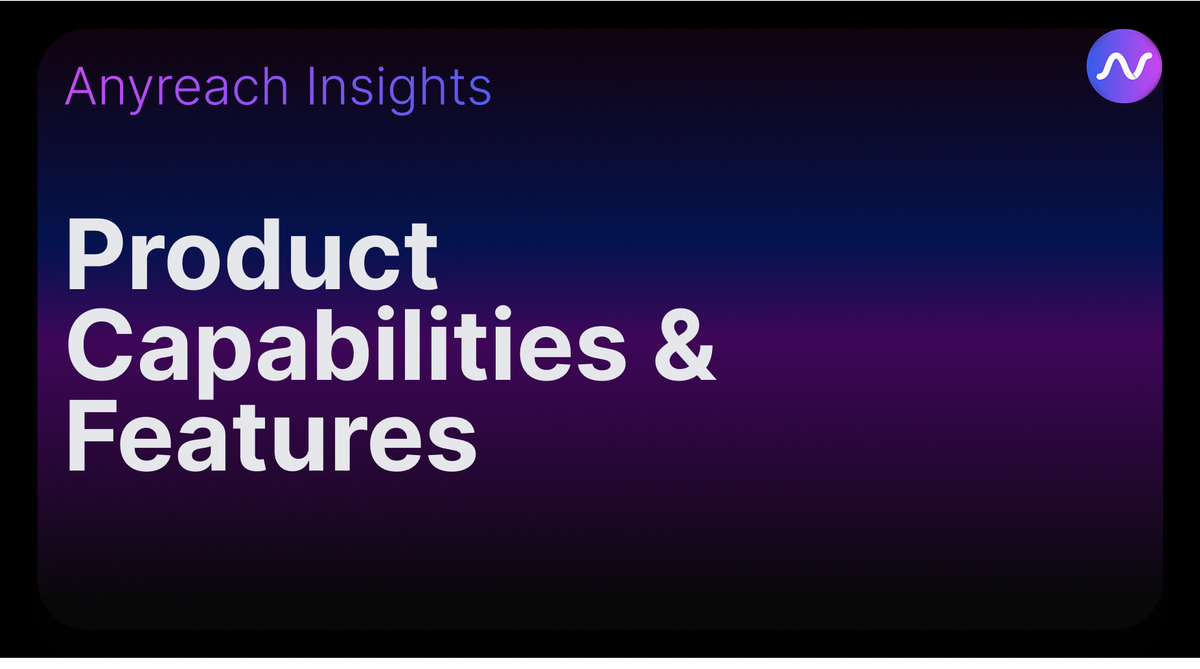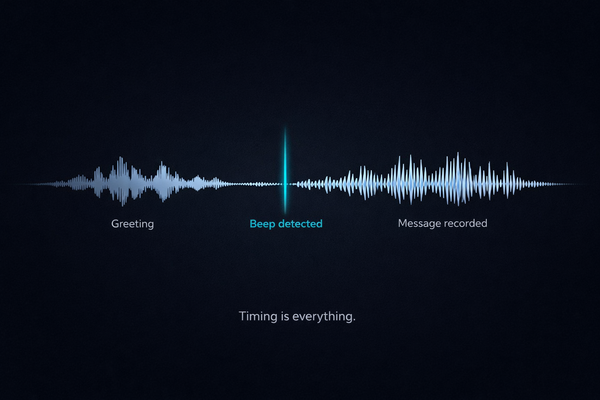How Does Omnichannel AI Transform Enterprise Customer Support and Sales Automation?

Enterprises are rapidly discovering that agentic AI isn't just another automation tool—it's a fundamental shift in how businesses handle customer interactions, sales workflows, and operational processes. As organizations navigate the complexities of implementing autonomous AI systems, understanding real-world applications becomes crucial for success.

What is Agentic AI for Customer Support?
Agentic AI for customer support represents autonomous systems that can independently handle customer interactions across multiple channels—voice, chat, SMS, and email—without constant human oversight. Unlike traditional chatbots, these AI agents understand context, make decisions, and complete complex tasks end-to-end.
Modern agentic AI systems go beyond scripted responses. They analyze customer intent, access multiple data sources, and execute actions like updating records, processing refunds, or scheduling appointments. For enterprises, this means transforming customer support from a cost center into a strategic advantage. According to McKinsey, companies implementing agentic AI in customer service see 30-50% reduction in handling times while improving customer satisfaction scores by 15-20%.
The technology leverages natural language processing, machine learning, and decision trees to create truly autonomous agents. These systems learn from each interaction, continuously improving their responses and expanding their capabilities. For BPOs handling millions of interactions monthly, this self-improvement capability is transformative.
How Does Omnichannel AI Automate Lead Qualification in BPOs?
Omnichannel AI revolutionizes lead qualification by creating a unified system that engages prospects across their preferred communication channels while maintaining context throughout the journey. BPOs leverage this technology to handle initial outreach, qualify leads based on predefined criteria, and seamlessly hand off warm prospects to human agents.
The automation process begins with intelligent routing. When a lead enters through any channel—website chat, phone call, SMS, or social media—the AI agent immediately accesses the prospect's history and engagement patterns. Using sophisticated scoring algorithms, the system evaluates factors like:
- Behavioral signals: Website visits, content downloads, email opens
- Demographic fit: Company size, industry, location
- Engagement level: Response times, question complexity, buying signals
- Historical data: Previous interactions, purchase history, support tickets
For BPOs managing multiple client campaigns, omnichannel AI provides unprecedented scalability. A single platform can handle thousands of simultaneous conversations, each personalized to the specific client's qualification criteria. Deloitte reports that BPOs using omnichannel AI for lead qualification see 40% improvement in conversion rates and 60% reduction in cost per qualified lead.
What Are Best Practices for Using Voice AI in Appointment Booking for Healthcare Services?
Voice AI in healthcare appointment booking requires careful balance between automation efficiency and patient care sensitivity. Best practices focus on creating natural, empathetic interactions while ensuring HIPAA compliance and accurate scheduling.
Successful implementations follow these key principles:
| Best Practice | Implementation Details | Expected Outcome |
|---|---|---|
| Natural Language Design | Use conversational flows that mirror human speech patterns | 85% first-call resolution rate |
| Multi-Intent Recognition | Handle scheduling, rescheduling, and cancellations in one call | 30% reduction in call transfers |
| Provider Matching | AI suggests appropriate specialists based on symptoms | 25% improvement in patient satisfaction |
| Compliance Integration | Built-in HIPAA protocols and audit trails | 100% regulatory compliance |
| Fallback Protocols | Seamless handoff to human agents for complex cases | 90% patient confidence scores |
Healthcare organizations report that voice AI reduces appointment scheduling time from an average of 8 minutes to under 3 minutes, while maintaining high accuracy rates. The key is training the AI on actual patient conversations, incorporating regional dialects, and understanding medical terminology variations.
How Can SMS Automation Enhance Outreach in Recruiting for Education Sectors?
SMS automation transforms education sector recruiting by meeting candidates where they are—on their mobile devices. With 98% open rates for text messages compared to 20% for emails, educational institutions leverage SMS to engage prospective students, faculty, and staff more effectively.
The automation workflow typically includes:
- Initial Engagement: Automated texts acknowledge applications within minutes, maintaining candidate interest
- Document Collection: AI-powered conversations guide applicants through required documentation
- Interview Scheduling: Two-way SMS conversations allow candidates to book interviews instantly
- Status Updates: Regular automated updates keep candidates informed throughout the process
- Onboarding Coordination: Post-acceptance SMS sequences guide new hires through orientation
Educational institutions using SMS automation report 3x higher response rates for recruiting outreach. The technology is particularly effective for reaching younger demographics and international candidates who may have varying email habits but universally use SMS.
What Role Does Chat Automation Play in IT Troubleshooting?
Chat automation revolutionizes IT troubleshooting by providing instant, 24/7 support that resolves common issues without human intervention. Modern chat automation systems handle 60-70% of IT tickets autonomously, freeing technical staff to focus on complex problems.
These systems excel at:
- Password resets and account unlocks: Automated identity verification and instant resolution
- Software installation guidance: Step-by-step instructions with screenshot sharing
- Network connectivity issues: Diagnostic scripts that identify and resolve common problems
- Hardware troubleshooting: Interactive diagnostics to isolate issues
- Knowledge base integration: Instant access to solutions for known issues
Gartner predicts that by 2025, 80% of IT support interactions will begin with automated chat, with 50% resolving without human escalation. The key to success is continuous learning—chat automation systems that analyze resolution patterns and update their knowledge bases show 15% monthly improvement in first-contact resolution rates.
How Do Enterprises Leverage Sales Automation Through Agentic AI?
Sales automation through agentic AI transforms the entire sales cycle, from initial outreach to closing deals. Enterprises deploy AI agents that autonomously manage repetitive tasks while providing intelligence that helps human salespeople focus on relationship building and strategic selling.
Key applications include:
Automated Outreach Campaigns
AI agents personalize outreach at scale, analyzing prospect data to craft individualized messages. They determine optimal send times, follow-up sequences, and channel preferences, resulting in 3x higher engagement rates than traditional automation.
Intelligent Lead Scoring
Beyond basic demographic scoring, agentic AI analyzes behavioral patterns, content engagement, and buying signals to predict purchase likelihood with 85% accuracy. This allows sales teams to prioritize efforts on high-value opportunities.
Meeting Preparation and Follow-up
AI agents automatically research prospects, compile relevant insights, and generate personalized talking points. Post-meeting, they create summary notes, update CRM records, and trigger appropriate follow-up sequences.
Pipeline Management
Autonomous monitoring of deal progress, with AI agents flagging at-risk opportunities and suggesting interventions. Companies report 25% improvement in forecast accuracy using AI-driven pipeline analysis.
What Makes Recruiting Through Agentic AI More Efficient?
Recruiting through agentic AI dramatically reduces time-to-hire while improving candidate quality. AI agents handle the entire preliminary screening process, engaging candidates through natural conversations that assess both skills and cultural fit.
The efficiency gains come from:
- Automated screening: AI conducts initial interviews via chat or voice, evaluating responses against job requirements
- Candidate engagement: 24/7 availability means candidates can interact when convenient, reducing drop-off rates by 40%
- Bias reduction: Standardized evaluation criteria ensure fair assessment across all candidates
- Predictive matching: AI analyzes successful employee profiles to identify best-fit candidates
- Seamless scheduling: Automated coordination between candidates and hiring managers eliminates back-and-forth emails
Companies implementing agentic AI for recruiting report 50% reduction in time-to-fill and 30% improvement in quality of hire metrics. The technology is particularly valuable for high-volume recruiting scenarios where human screeners would be overwhelmed.
Implementation Considerations for Different Industries
Healthcare Administration
Healthcare organizations must balance automation benefits with strict compliance requirements. Successful implementations focus on administrative tasks like appointment scheduling, insurance verification, and patient reminders while maintaining human oversight for clinical decisions.
Telecommunications
Telecom companies leverage omnichannel AI to handle complex technical support queries across multiple touchpoints. The key is training AI on vast libraries of technical documentation and common troubleshooting scenarios while maintaining escalation paths for network-critical issues.
Consulting Services
Consulting firms use agentic AI to automate client onboarding, project status updates, and resource scheduling. The technology excels at maintaining client communication while consultants focus on strategic deliverables.
Education
Educational institutions deploy AI agents for student services, from admissions inquiries to course registration assistance. The technology scales to handle peak periods like enrollment season while maintaining personalized interactions.
Measuring Success: Key Performance Indicators
Enterprises track specific metrics to evaluate agentic AI effectiveness:
| Use Case | Primary KPIs | Industry Benchmarks |
|---|---|---|
| Customer Support | First Contact Resolution, CSAT Scores | 70% FCR, 85% CSAT |
| Lead Qualification | Conversion Rate, Cost per Lead | 25% conversion, 50% cost reduction |
| Appointment Booking | Booking Completion Rate, No-show Reduction | 80% completion, 30% fewer no-shows |
| IT Troubleshooting | Ticket Resolution Time, Escalation Rate | 60% faster resolution, <30% escalation |
| Sales Automation | Pipeline Velocity, Deal Close Rate | 40% faster cycles, 20% higher close rate |
| Recruiting | Time to Hire, Quality of Hire | 50% faster, 30% better retention |
Future Outlook: The Evolution of Enterprise AI Applications
As agentic AI technology matures, we're seeing emergence of more sophisticated applications:
- Multi-agent orchestration: Multiple AI agents collaborating to handle complex, multi-step processes
- Predictive intervention: AI anticipating customer needs before they articulate them
- Emotional intelligence: Advanced sentiment analysis enabling more empathetic interactions
- Cross-functional integration: AI agents seamlessly working across departments and systems
The trajectory points toward AI agents becoming integral team members rather than just tools, with enterprises that embrace this shift gaining significant competitive advantages.
Frequently Asked Questions
How quickly can enterprises see ROI from agentic AI implementation?
Most enterprises see initial ROI within 3-6 months of deployment, with full value realization occurring within 12-18 months. Quick wins typically come from high-volume, repetitive tasks like appointment booking or initial customer inquiries, where automation immediately reduces labor costs while improving response times.
What's the difference between traditional chatbots and agentic AI for customer support?
Traditional chatbots follow predetermined scripts and can only handle simple, predefined queries. Agentic AI understands context, learns from interactions, makes autonomous decisions, and can complete complex multi-step tasks without human intervention. While chatbots might answer "What are your hours?", agentic AI can diagnose technical issues, process returns, and even negotiate service upgrades.
How do enterprises ensure data security when implementing omnichannel AI?
Enterprises implement multiple security layers including end-to-end encryption, role-based access controls, regular security audits, and compliance certifications (SOC 2, HIPAA, GDPR). AI systems are designed with data minimization principles, processing only necessary information and maintaining detailed audit trails for all interactions.
Can small businesses benefit from agentic AI, or is it only for large enterprises?
Small businesses increasingly benefit from agentic AI through scalable, cloud-based solutions. While enterprise deployments might handle millions of interactions, small businesses use the same technology to automate customer support, appointment booking, and lead qualification at their scale. The key is choosing solutions with flexible pricing models that grow with the business.
What training is required for employees to work alongside agentic AI?
Successful implementation requires 2-4 weeks of training focusing on AI collaboration rather than competition. Employees learn to leverage AI for routine tasks while developing skills in complex problem-solving, relationship management, and strategic thinking. Training includes hands-on practice with AI tools, understanding escalation protocols, and learning to interpret AI-generated insights.
The transformation brought by agentic AI in enterprise applications represents more than technological advancement—it's a fundamental shift in how businesses operate. As organizations move from pilot programs to full-scale deployments, those who successfully integrate these autonomous systems while maintaining human oversight and creativity will define the next era of enterprise excellence. The key lies not in replacing human capabilities but in augmenting them, creating synergies that deliver exceptional value to both businesses and their customers.
]]>




![[AI Digest] Agents Coordinate Plan Deploy Scale](/content/images/size/w600/2025/07/Daily-AI-Digest.png)